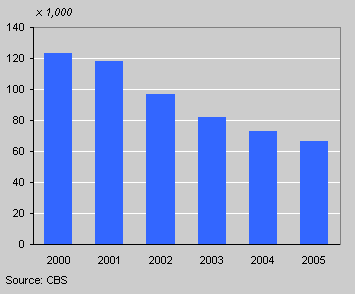Population counter at 16.2 million

At the beginning of March 2001 Statistics Netherlands’ population counter registered the 16 millionth inhabitant in the Netherlands. Since then the population has grown by another 200 thousand people. In the course of last weekend the population counter counted exactly 16,200,000 inhabitants. The population is expected to increase by 82 thousand in 2003.
Population growing more slowly
The number of inhabitants in the Netherlands will continue to increase in the near future, but the growth rate is slowing down. In 2001 population growth was 118 thousand, in 2002 it grew by less than 100 thousand. The lower growth rate is mainly caused by decreasing immigration and increasing emigration.
Population growth, 2000-2005

Weaker economy curbs immigration
The decrease in immigration is connected with the less favourable economic prospects, which attracted fewer labour migrants to the Netherlands. The number of asylum seekers has also fallen, from 44 thousand in 2000 to 20 thousand in 2002, although not all these asylum seekers are recorded as immigrants. The increase in emigration was caused by the larger number of Dutch natives who left the country to live abroad.
Population expected to grow by 82 thousand in 2003
Statistics Netherlands expects immigration to be relatively low again in 2003, while emigration will probably continue at the same level. The number of babies born will be slightly lower, the number of deaths will rise slightly. This will all result in an expected increase of 82 thousand people this year.
Population will increase until 2040
The population will increase for nearly forty more years, reaching its maximum at around 2040: 17.7 million. The growth rate is slowing down gradually as the mortality rate increases. More people are dying because the population in ageing.
Life expectancy at birth, 1995-2010

Life expectancy continues to increase
The increase in the number of deaths is not the consequence of a decrease in life expectancy. On the contrary, life expectancy will increase further in coming years, especially for men: from 76.1 years in 2003 to 77.0 years in 2010. This is because fewer men started to smoke in the seventies. More women, on the other hand have started to smoke, and therefore female life expectancy will not increase in this period.
Andries de Jong and Joop de Beer